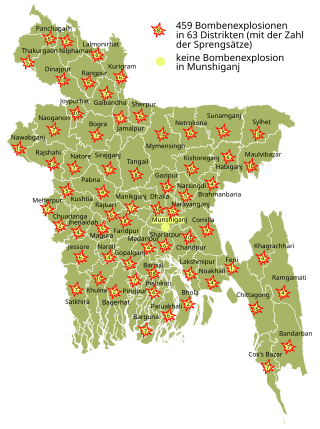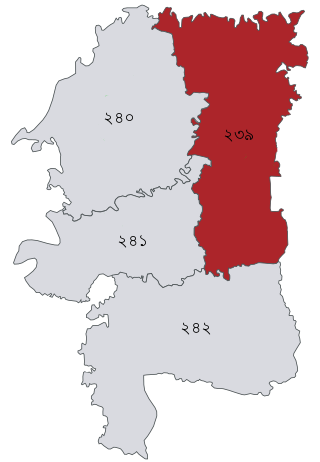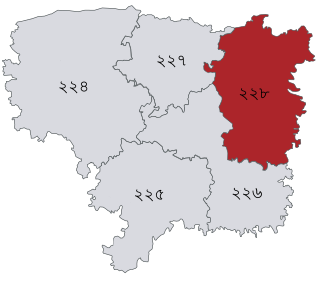Related Research Articles

Politics of Bangladesh takes place in a framework of a parliamentary representative democratic republic, whereby the Prime Minister of Bangladesh is the head of government and of a multi-party system. Executive power is exercised by the government. Legislative power is vested in both the government and parliament. The Constitution of Bangladesh was written in 1972 and has undergone seventeen amendments.
2001 (MMI) was a common year starting on Monday of the Gregorian calendar, the 2001st year of the Common Era (CE) and Anno Domini (AD) designations, the 1st year of the 3rd millennium and the 21st century, and the 2nd year of the 2000s decade.
Shah Abu Muhammad Shamsul Kibria, known as SAMS Kibria or Shams Kibria, was a Bangladeshi economist, diplomat and politician.

The history of Bangladesh (1971–present) refers to the period after the independence of Bangladesh from Pakistan.
The 2004 Dhaka grenade attack took place at an anti-terrorism rally organised by Awami League on Bangabandhu Avenue on 21 August 2004. The attack left 24 dead and more than 500 injured. The attack was carried out at 5:22 pm after Sheikh Hasina, the leader of opposition had finished addressing a crowd of 20,000 people from the back of a truck. Hasina also sustained some injuries in the attack.

General elections were held in Bangladesh on 5 January 2014, in accordance with the constitutional requirement that elections must take place within the 90-day period before the expiration of the term of the Jatiya Sangshad on 24 January 2014.

On 5 February 2013, protests ignited in Shahbagh, Bangladesh, fueled by the call for the execution of the convicted war criminal Abdul Quader Mollah. Previously sentenced to life imprisonment, Mollah was convicted on five of six counts of war crimes by the International Crimes Tribunal of Bangladesh. Mollah supported the West Pakistan during the 1971 Bangladesh Liberation War and played a crucial role in the murder of numerous Bengali nationalists and intellectuals. The demonstrations also sought the government's ban on the radical right-wing and conservative-Islamist group, Jamaat-e-Islami from participating in politics, including elections, and a boycott of institutions supporting or affiliated with the group.

Bangladesh has experienced terrorism in the past conducted by a number of different organisations. In the past, both ISIL and other terrorist organisations had claimed to be active in the country. However, the Bangladeshi government believes that they mainly operated through local affiliates, before being neutralised by security forces.

Sheikh Fazle Noor Taposh is a Bangladeshi politician and former mayor of South Dhaka. Previously he served as a member of the Bangladesh Parliament for Dhaka-10 and Dhaka-12 from the Bangladesh Awami League. He is a grand-nephew of Bangladesh's first president Sheikh Mujibur Rahman and a first-cousin-once-removed of Bangladesh's second female prime minister Sheikh Hasina. He has been missing since the fall of his aunt Sheikh Hasina's regime on 5 August 2024.
Harkat-ul-Jihad-al-Islami Bangladesh, [transl. Jihad movement of Islam of Bangladesh] is the Bangladeshi branch of the terrorist group Harkat-ul-Jihad-al-Islami (HuJI). It is banned in Bangladesh and is a Proscribed Organisation in the United Kingdom under the Terrorism Act 2000.
The 2001 Bagerhat bombing was a bomb attack on 23 September 2001 in Mollahat, Bagerhat District, Bangladesh. It took place at Khalilur Rahman Degree College during an Awami League election rally led by Member of Parliament Sheikh Helal Uddin, and resulted in the death of nine people.

The Khulna Metropolitan Police (KMP), is a metropolitan police unit of the Bangladesh Police for the Khulna Metropolitan Area based in Khulna City.

Moulvibazar-3 is a constituency represented in the Jatiya Sangsad of Bangladesh since 2024 by Mohammad Zillur Rahman of the Awami League.

Sunamganj-3 is a constituency represented in the Jatiya Sangsad of Bangladesh since 2008 by M. A. Mannan of the Awami League.

Habiganj-1 is a constituency represented in the Jatiya Sangsad of Bangladesh.

Sunamganj-4 is a constituency represented in the Jatiya Sangsad of Bangladesh.

Sunamganj-1 is a constituency represented in the Jatiya Sangsad of Bangladesh since 2008 by Moazzem Hossain Ratan of the Awami League.

Sunamganj-5 is a constituency represented in the Jatiya Sangsad of Bangladesh since 2008 by Mohibur Rahman Manik of the Awami League.
Moazzem Hossain Ratan is a Bangladesh Awami League politician and the incumbent Jatiya Sangsad member representing the Sunamganj-1 constituency since 2009.

The Bangladesh Krishak League is a farmers' organization in Bangladesh affiliated It's mother party the Bangladesh Awami League. It was established on April 19, 1972, with the aim of representing farmers, advocating for their rights, and supporting agricultural development.
References
- ↑ "Incident Summary for GTDID: 200109260004". start.umd.edu. Retrieved 1 February 2018.
- ↑ "Bangladesh rally bombed". BBC News. 23 September 2001. Retrieved 1 February 2018.
- ↑ Ethirajan, Anbarasan (2 December 2011). "Bangladesh panel submits findings". BBC News. Retrieved 1 February 2018.
- ↑ Ahsan, Zayadul. "A grisly reminder of unsolved killings". The Daily Star. Retrieved 1 February 2018.
- ↑ Islam, Shariful (14 June 2008). "No breakthrough yet in probe into 16 cases". The Daily Star. Retrieved 1 February 2018.